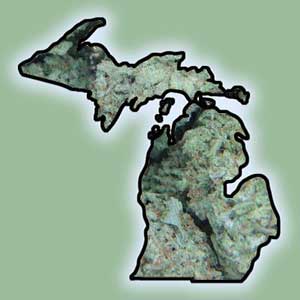 The final score: Statewide Initiatives 0-6, Marijuana Proposals 5-0. Why, and what does it mean for pending marijuana legislation in the Senate?
The final score: Statewide Initiatives 0-6, Marijuana Proposals 5-0. Why, and what does it mean for pending marijuana legislation in the Senate?
By Rick Thompson
“The people have spoken.” That’s the standard post-election tagline used by every successful political campaign, but not all victories are created equal. In a squeaker of an election the losers often cite weather or misleading public relations campaigns to turn a loss into a less-damaging loss. In 2012, Michigan citizens made a statement about the nature of our political landscape that was decisive, definitive and durable- and very marijuana-friendly.
Besides the Presidency and House races, there were six statewide ballot measures and five local measures of note. The six Proposals ranged from restricting Congress’ ability to levy taxes and build bridges to collective bargaining. Almost all of the Proposals were written as amendments to the State Constitution; all were defeated, some soundly. Five local issues empowering marijuana freedom all won handily, and with a minimum of advertising and resource allocation.
The methodology was the same (except for the Detroit measure- see below). The rules are the same. Each of the eleven issues had petition language approved, went through the signature collection process and then had the signatures verified. Once the individual issues were approved there were debates, interviews and advertisements. Support and resistance each had opportunities to express themselves. On election day advocates and detractors watched the fruit of their labors come to harvest.
The astute observer sees a continuous cascade of marijuana victories in Michigan, but even an incompetent politico must agree there is something about this issue that galvanizes the state’s population. In 2008 the Michigan Medical Marijuana Act (the Act) was passed with a 63% vote- at that time, a staggering number. This year that figure was surpassed by the success of several local initiatives: Ypsilanti passed with a 74%YEs vote, Flint passed by 57%, Detroit by 65%, and Kalamazoo by 57.4%. Grand Rapids, the acknowledged heart of conservatism in Michigan, approved marijuana decriminalization by 58.9%. By comparison, President Barack Obama won Michigan with 54.3% of the vote.
Advocates praise the five-city sweep as confirmation of what they’ve been saying all along- Michigan is not a Red state, not a Blue state but a Green state. Medicinal use has grown steadily since 2008 but recreational use has always been prevalent. This election year shows the support base for reforming marijuana laws stretches from Lake to Lake and incorporates members of all political parties.
There is proof that these five wins were indicative of the mindset of all Michigan’s voters. The cities involved were far-flung across the lower peninsula, and the methods through which they proposed changes were equally as diverse.
On the traditionally conservative western side of the state, Kalamazoo authorized up to three medical marijuana distribution centers (called ‘dispensaries’) within the city proper. They will be a compliment to the other centers already operating in Oshtemo and other suburbs. 57.4% of residents voted Yes despite threats from the Attorney General that the measure violates state law and that a court challenge will ensue.
The Grand Rapids measure made simple possession of marijuana a civil infraction, resolved by issuing a ticket, instead of a misdemeanor, resolved with an arrest, a court hearing and potential jail time. Marijuana’s biggest foe in the Congress, Sen. Jones, hails from this district. The House Representative from the area, Rep. Brandon Dillon, supported the winning Proposal 2, as did the current Mayor, the former Mayor and a majority of the City Council. 61 out of 77 precincts supported the Proposal.
Moving Eastward, the Ann Arbor suburb of Ypsilanti approved a Lowest Law Enforcement Priority measure by a 74%. Kalamazoo did the same thing in 2011. Flint, the impoverished and crime-statistic leading community, approved their measure by a wide margin. It legalizes the possession of less than one ounce of marijuana on private property by any adult 19 years of age or older.
Detroit, Michigan’s largest and most recognized city, also legalized possession of marijuana on private property for adults 21 and over. The Detroit proposal met stiff resistance when the petitions were submitted for verification- in 2010. Two election cycles passed while the Detroit Election Commission tried everything in their power to prevent Proposal M from appearing before the voters- they took their issue all the way to the Michigan Supreme Court, who sided with the Committee for a Safer Detroit.
The ramifications of the sweep should be felt across the political board. Sen. Jones should re-evaluate his personal policies regarding marijuana use (he calls medical marijuana patients ‘potheads’ when chairing the Senate Judiciary Committee). The Attorney General should eliminate the term ‘the will of the people’ when justifying his jihad against the Act. More House Representatives should follow the example of Reps. Callton and Irwin, two outspoken advocates for the medical marijuana communities who were easily re-elected to their positions.
More importantly, this crucial acknowledgement of the legitimate existence of marijuana in our state should come with a caveat: the death of the Walsh Bills and all other anti-marijuana legislation pending in the House and Senate. Every Senator can see what the true will of the people is, and it is not more restrictions. Every Representative can see that the marijuana lobby in Michigan is powerful and they should reject efforts to make patients treat marijuana like a loaded gun or a bottle of Mad Dog 20/20. All houses of government should flatly refuse the premise that people cannot decide for themselves what is safe and what is not.
Millions (some say billions) of dollars were poured into the Michigan media machine to secure passage of Matty Moroun’s Bridge deal (it failed) or to establish a Constitutional base for collective bargaining (it lost). Many of those dollars came from out-of-state sources whose special interests bought influence among elected officials, paid signature collectors and secured primetime commercial spots (money wasted). With almost no budget, no television advertising and no high-profile spokesperson the five medical marijuana initiatives easily passed.
Should a serious effort to curtail the Act resurface in 2013, national money will be available to fight it. Michigan’s success should be seen by the Drug Policy Alliance, the Marijuana Policy Project and Americans for Safe Access as the model other states should emulate when launching medical marijuana or legalization campaigns. With the popular vote supporting marijuana reform, with Congressional champions reading the right message and with the national trend toward empowerment of marijuana use, Michigan has positioned herself at the forefront of the issue- not just in the Midwest, but across America as well.
Rick Thompson is on 2 radio shows and writes for several MM publications in Michigan


























